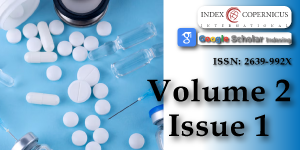Some Aspects of medicine distribution in Sudan
Main Article Content
Abstract
The strategy of price liberalisation and privatisation had been implemented in Sudan over the last decade, and has had a positive result on government deficit. The investment law approved recently has good statements and rules on the above strategy in particular to pharmacy regulations. Under the pressure of the new privatisation policy, the government introduced radical changes in the pharmacy regulations. To improve the effectiveness of the public pharmacy, resources should be switched towards areas of need, reducing inequalities and promoting better health conditions. Medicines are financed either through cost sharing or full private. The role of the private services is significant. A review of reform of financing medicines in Sudan is given in this study. Also, it highlights the current drug supply system in the public sector, which is currently responsibility of the Central Medical Supplies Public Corporation (CMS). In Sudan, the researchers did not identify any rigorous evaluations or quantitative studies about the impact of drug regulations on the quality of medicines and how to protect public health against counterfeit or low quality medicines, although it is practically possible. However, the regulations must be continually evaluated to ensure the public health is protected against by marketing high quality medicines rather than commercial interests, and the drug companies are held accountable for their conduct.
Article Details
Copyright (c) 2018 Omer AM.

This work is licensed under a Creative Commons Attribution 4.0 International License.
Ministry of Health (MOH). Act 2001: Pharmacy, Poisons, Cosmetic and Medical Devices. Ministry of Health (MOH): Sudan. (2001).
Alubo SO. Death for sale: A study of drug poisoning and deaths in Nigeria. Soc Sci Med 1994; 38: 97-103. Ref.: https://goo.gl/KaXFHs
Andalo D. Counterfeit drugs set alarm bells ringing. Pharmaceutical Journal. 2004; 273-341. Ref.: https://goo.gl/YRb9sa
Bryman A. Social Research Method. (2nd Edition). Oxford University Press. 2004. Ref.: https://goo.gl/Ngcdyf
Elfadil AA. Quality assurance and quality control in the CMSPO. 2005.
Erhun WO, Babalola OO, Erhun MO Drug Regulation and Control in Nigeria: The Challenge of Counterfeit Drug. Journal of Health and Population in Developing Countries, 2001; 4: 23-34. Ref.: https://goo.gl/6z6HW7
Gamal KM, Omer AM. A prescription for improvement: A short survey to identify reasons behind public sector pharmacists’ migration. World Health and Population 2006: 1-24.
Helling-Borda M. The role and experience of the World Health Organisation in assisting countries to develop and implement national drug policies. Australian Prescriber. 1995; 20 (Supp. 1): 34–38.
Jallow M. Evaluation of national drug policy in the Gambia, with special emphasis on the essential drug programme. University of Oslo: Norway. 1991.
Lexchin J. Drug makers and drug regulators: Too close for comfort. A study of the Canadian situation. Social Science and Medicine. 1990; 31: 1257-1263. Ref.: https://goo.gl/Zgar9E
Lofgren H, Boer R. Pharmaceuticals in Australia: developments in regulation and governance. Soc Sci Med. 2004; 58: 2397-2407. Ref.: https://goo.gl/Qf6yue
Ministry of Health (MOH). 25 years Pharmacy Strategy (2002-2027). Khartoum: Sudan. Unpublished Report. 2003.
National Drug Policy (NDP). Ministry of Health (MOH): Sudan. 1997.
Osibo OO. Faking and counterfeiting of drugs. West African Journal of Pharmacy. 1998; 12: 53-57.
Ratanwijitrasin S, Soumerai SB, Weerasuriya K. Do national medicinal drug policies and essential drug programmes improve drug use? A review of experiences in developing countries. Soc Sci Med. 2001; 53: 831–844. Ref.: https://goo.gl/54LNe9
Rudolf PM, Bernstein IBG. Counterfeit Drugs. N Engl J Med. 2004; 350: 1384 - 1386. Ref.: https://goo.gl/8bpYdU
Shakoor O, Taylor RB, Behrens RH. Assessment of the substandard drugs in developing countries. Tropical Medicines and International Health.1997; 2: 839-845. Ref.: https://goo.gl/fg8SRz
Sibanda FK. Regulatory excess: The role of regulatory impact assessment and the Competition Commission. In: Proceedings of the Pro-Poor Regulation and Competition Conference hosted by the Centre of Regulation and Competition (CRC), University of Manchester, UK, and the School of Public Management and Planning, University of Stellenbosch, Cape Town, 7-9 September 2004. Ref.: https://goo.gl/5qyiNf
WHO. Counterfeit drugs: guidelines for the development of measures to combat counterfeit drug. Geneva: World Health Organisation. 1991; WHO/EDM/ QSM/1990.1.
World Health Organisation / Drug Action Programme (WHO/DAP). Comparative analysis of international drug policies. Report from the second workshop Geneva, June 1996. Ref.: https://goo.gl/oEdM99
WHO. International drug policies. 2009; Geneva: Switzerland.
Velpandian V, Elangovan S, Agnes LN, Musthafa MM. Clinical Evaluation of Justicia tranquebariensis L. In the Management of Bronchial Asthma, American Journal of Phytomedicine and Clinical Therapeutics. 2014; 9: 1103-1111. Ref.: https://goo.gl/kVe2C6
Shankar KR, Ratna Kumari NS, Kiranmayi GVN. In vitro Study of Antioxidant and Antimalarial Activities of New Chromeno-Pyrano-Chromene Derivative. American Journal of Phytomedicine and Clinical Therapeutics. 2014; 9: 1169-1176. Ref.: https://goo.gl/DA6cCp
Ramprabhu R, Karthik JA, Ravikanth K, Maini S, Adarsh. Evaluation of Regular Teat Sanitization Control Measures for Prevention of Sub Clinical Mastitis in Cattle, American Journal of Phytomedicine and Clinical Therapeutics, AJPCT 9: 1212-1216. Ref.: https://goo.gl/fqsqrc
Omer AM. The impact of the pharmaceutical regulations on the quality of medicines on the Sudanese market: importers’ perspective. Prime Journals of Business Administration and Management (BAM). 2011; 1: .295-302.
Omer AM. Chapter 5: Regulatory privatisation, social welfare services and its alternatives, In: Advances in Medicines and Biology. 2013; 72: Editor: Leon V. Berhardt, 2013 NOVA Science Publishers, Inc., 69-86.





